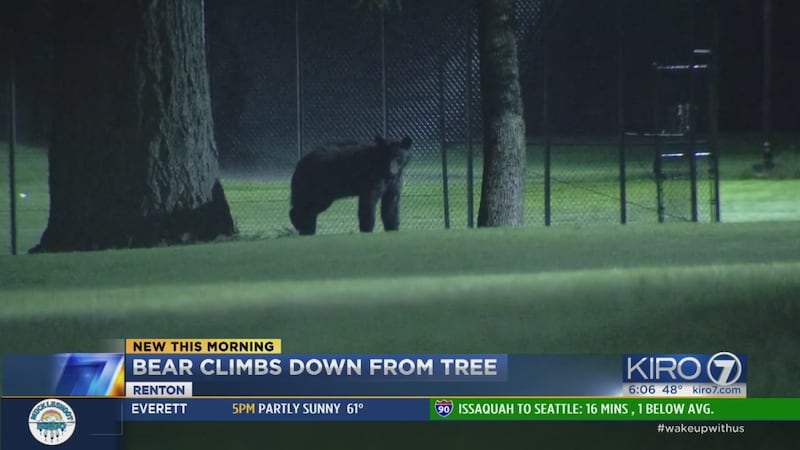Thousands of new residents settling into homes in east King County may be luring more bears into neighborhoods, according to an expert with Western Wildlife Outreach.
Large carnivore specialist and wildlife biologist Darrell Smith talked to KIRO 7 News about some of the recent high-profile sightings. Within a week's time: a mother bear and her cub were spotted at a Kent park, wildlife officers tranquilized a bear in a Lakewood backyard, and a bear climbed into a tree near a Renton school and stayed there for nearly 20 hours.
Bear sightings from Bothell down to Auburn aren’t anything new as the lowlands in east King County provide some of the best habitat in the state for black bears.
“Low elevation, plenty of food and snow,” Western Wildlife Outreach biologist Darrell Smith said. “It’s a very good black bear habitat. So we get a few aggravated reactions [from bears when we’re in their habitat], but bears are actually pretty easy to live with.”
But as new people move into cities in bear country, such as Issaquah and Kent, precautions aren’t being taken to keep the bears away from homes.
Smith said the important thing for residents – new or lifelong – in bear country is not to attract the animals with trash or bird feed.
A study listed in a project from Western Wildlife Outreach claims that once a bear gets a taste of human garbage, they can become "food conditioned" and continue a habit of searching for food in garbage cans.
According to the Sanitation Services Assessment report, bear-resistant trash containers could cut back on food conditioning and bear sightings.
Efforts are underway in some cities, such as Snoqualmie, to encourage the use of bear-resistant containers.
But out of 24 cities researched in Eastside King County, less than half have negotiated contracts with sanitation services on the use of bear-resistant containers. Several of these cities correlate with reports of human-bear encounters, the study said.
A waste management authority in South Lake Tahoe is putting this practice to the test. It started offering homeowners loans to buy bear-proof garbage bins in an effort to reduce conflicts with the animals who wander into neighborhoods in search of an easy meal.
“We hope that the neighbor associations [in Washington] will help influence trash companies to make bear-resistant trash containers at decent prices,” Smith said. “It only takes one house in a neighbor to attract a bear, so it’s got to be a fairly universal effort [in the neighborhood]"
Smith and his organization received around 900 calls about bear sightings, though he said those sightings probably come down to about 30 bears wandering around in neighborhoods.
Though bear-related injuries are rare in Washington state, here's what to do if you come in close contact with a bear:
- Stay calm and avoid direct eye contact, which could elicit a charge. Try to stay upwind and identify yourself as a human by standing up, talking and waving your hands above your head.
- Do not approach the bear, particularly if cubs are present. Give the bear plenty of room.
- If you cannot safely move away from the bear, and the animal does not flee, try to scare it away by clapping your hands or yelling.
- If the bear attacks, fight back aggressively. As a last resort, should the attack continue, protect yourself by curling into a ball or lying on the ground on your stomach and playing dead.
The Department of Fish and Wildlife responds to bear sightings when there is a threat to public safety or property. In an emergency, dial 911.
Western Wildlife works with Woodland Park Zoo to educate people who live in bear country. You can find more educational materials here.
Cox Media Group








